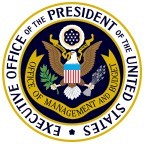Office of Management and Budget
USINFO | 2013-11-13 14:33
|
Office of Management and Budget |
 |
|
Agency overview |
|
Formed |
1970 |
|
Preceding Agency |
Bureau of the Budget |
|
Headquarters |
Eisenhower Executive Office Building |
|
Employees |
529 |
|
Annual budget |
$92.8 million (FY 2011) |
|
Agency executive |
Sylvia Mathews Burwell, Director |
|
Parent Agency |
Executive Office of the President of the United States |
|
Website |
|
Office of Management and Budget |
The Office of Management and Budget (OMB) is the largest office within the Executive Office of the President of the United States (EOP). The Director of the OMB is a member of the President's Cabinet. The main job of the OMB is to assist the President to prepare the budget. The OMB also measures the quality of agency programs, policies, and procedures and to see if they comply with the President's policies.
The current OMB Director is Sylvia Mathews Burwell.
History
The Bureau of the Budget, OMB's predecessor, was established as a part of the Department of the Treasury by the Budget and Accounting Act of 1921, which was signed into law by President Warren G. Harding. The Bureau of the Budget was moved to the EOP in 1939, and reorganized into OMB in 1970 during the Nixon administration.[3] The first OMB included Roy Ash (head), Paul O'Neill (assistant director), Fred Malek (deputy director) and Frank Zarb (associate director) and two dozen others. In the 1990s, OMB was reorganized to remove the distinction between management staff and budgetary staff by combining those dual roles into each given program examiner within the Resource Management Offices.
Mission
The OMB's predominant mission is to assist the President in overseeing the preparation of the federal budget and to supervise its administration in Executive Branch agencies. In helping to formulate the President's spending plans, the OMB evaluates the effectiveness of agency programs, policies, and procedures, assesses competing funding demands among agencies, and sets funding priorities. The OMB ensures that agency reports, rules, testimony, and proposed legislation are consistent with the President's Budget and with Administration policies.
In addition, the OMB oversees and coordinates the Administration's procurement, financial management, information, and regulatory policies. In each of these areas, the OMB's role is to help improve administrative management, to develop better performance measures and coordinating mechanisms, and to reduce any unnecessary burdens on the public.
Share this page